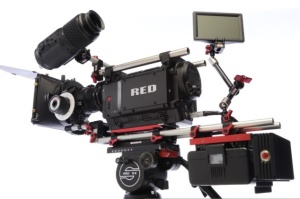So many photographers think that buying a DSLR capable of shooting video and taking a workshop on how to use it, is all they’ll need to do in order to get into the business of video production. They couldn’t be more wrong. It’s kind of like someone buying a really “good” camera, and thinking that’s all they need to be able to shoot a professional photography assignment. And yet, so many of my professional photographer colleagues continue to think that it’s about the camera, instead of the skill set.
For starters, most of the professional video productions I do,I wouldn’t be able to shoot with a DSLR camera. Don’t get me wrong, a DSLR can produce stunning video, but those cameras fall short on certain tasks. More importantly, they won’t necessarily meet the expectations that many high-end advertising art directors require.  You’ll look like a fool if you show up with your DSLR kit when they expected a lot more in the way of gear.
You’ll look like a fool if you show up with your DSLR kit when they expected a lot more in the way of gear.
I get quite annoyed when I see the proliferation of DSLR video and filmmaking workshops that mislead photographers that this “tool” or camera will be sufficient for any and all video assignments – because it won’t. It may be fine for a wedding shoot and I even made a feature length film with a DSLR, but for a lot of corporate jobs I shoot – it just doesn’t cut it.
My advice to photographers who want to learn video:
- Learn how to think and shoot video. It’s not just about the camera. When I shoot motion, I’m thinking and shooting much differently than I do for stills.
- Pick the right camera for the job. That means you’ll have to know how to use a traditional video camera or a more sophisticated camera like a RED or hire someone who does.
- If you contain your video experience and knowledge to the DSLR, realize that your competition will be fierce. The buy in price is low – so you won’t be the only one who thinks they can buy a relatively inexpensive camera and go after video jobs.
- Stay away from DSLR workshops. They are way too limited and limiting. Plus, they are based on technology that changes way too fast. It may be tempting – but you’ll place yourself in the lower end crowd and will most likely be competing on price. How low are you prepared to go – or can you go and stay in business.
- Learn video and/or filmmaking the right way. Don’t make it dependent on a particular camera. Learn the cinematic language and how to translate the message in a motion medium.
- The business of video is much different than that of still photography. If the workshop you are thinking about taking doesn’t address sound business practices – move on. You can lose your shirt on a video production if you don’t know how to price and/or structure your shoots.
Think about it. If you were just starting out and learning photography – would you take a workshop that was about a particular camera? Obviously not, so why would you approach learning video that way?
For more information about video production check out Gail’s guide The Craft and Commerce of Video and Motion


I have been running video workshops and bootcamps for 25 years. I could not care less what kind of camera the students bring.
Michael, I know. I learned from your disciples Dirck and PF. My point is exactly as you state – I don’t really care about the camera – I use whatever gets the job done – the best way. To center a workshop around a particular camera is shortsighted thinking because technology changes too quickly.
I have been trying to find a video workshop that is not in CA or NY. Maybe Atlanta or Florida. I have a DSLR camera, but I want to take the workshop not for the camera, but to help me avoid a lot of rookie mistakes. Any one know of any good workshops in the south. I could even venture to NY. Email me at greg@gregville.com. Thanks.
I agree with Gail’s assessment and with my video mentor Mr. Rosenblum’s comment. I don’t care either, but to say THIS or THAT is the type of camera you need to use – any one type of camera is wrong. Pick the right tool for the job.
Thank you for saying that. Couldn’t agree more.
That said, I think there should be a general warning about any kind of workshop, not just DSLR video. With the rapid change in the industry in recent years, and the influx of people interested in the industry we’ve seen rapid growth of all kinds of workshops, most of them taught by people who are (a) not gifted teachers, (b) just relay their personal practices instead of teaching fundamental techniques that build a students skill, (c) are often photographers who find it easier and faster to replace declining revenue by being an overpaid story teller and destination travel tour guide.
If people want to learn, they should instead either assist, find a mentor, or find peers to collaborate and experiment with.
I took my share of workshops over the years and very few were worth the money and time. I haven’t taken one in a long time since realizing that.
Jan, The “education” field is glutted right now. Some workshops are good – some aren’t and I’ve spent money and time on both kinds over the years. But I have one rule and that is I never take a workshop or class unless I am committed to apply the knowledge learned. I totally agree with you about mentors and collaborations. I have been extremely fortunate in my life to have had remarkable mentors and still do. You’re never too old to learn from others.
Yes, I agree whole heartedly. Your comments make sense for someone seeking to start a serious professional video production business to serve sophisticated clients. However, most DSLR movie workshops are not targeting the would be professional videographer. They are designed for a growing number of people, mostly “serious hobbyists” interested in shooting personal and film festival shorts in a highly cinematic style. This sub group of amateur filmmakers is growing, attracting lots of adherents, and is well served by high quality DSLR workshops.